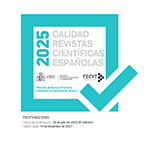Governmental Control of Spanish Public Televison and Pluralism in Newcasts
Abstract
The goal of this study is to analyze and compare television newscasts broadcast during the most recent terms of office for Spain’s two primary political parties: the PSOE (the Socialist Party) and the PP (the conservative People’s Party); in order to better understand the characteristics of RTVE’s (The Spanish Radio and Television Corporation, a stateowned entity) communications strategy and to determine if changes in the governing party as well as at the senior management level in the newsroom have influenced the editorial policy of public television. The level of formal pluralism recorded does not always imply a neutral approach to reporting, nor does it mean that rigorous standards are always enforced. The facts show that in many cases there is no relationship between the quantitative and qualitative elements of any given story. The results of this study confirm that political consensus with regards to public television improves accuracy, transparency and pluralism of information, in addition to decreasing manipulation and censorship.Downloads
Article download
License
In order to support the global exchange of knowledge, the journal Estudios sobre el Mensaje Periodístico is allowing unrestricted access to its content as from its publication in this electronic edition, and as such it is an open-access journal. The originals published in this journal are the property of the Complutense University of Madrid and any reproduction thereof in full or in part must cite the source. All content is distributed under a Creative Commons Attribution 4.0 use and distribution licence (CC BY 4.0). This circumstance must be expressly stated in these terms where necessary. You can view the summary and the complete legal text of the licence.










